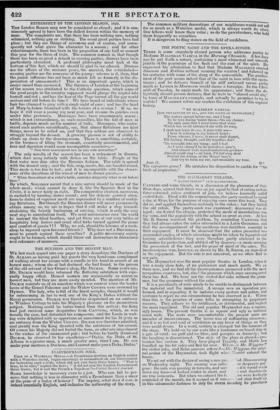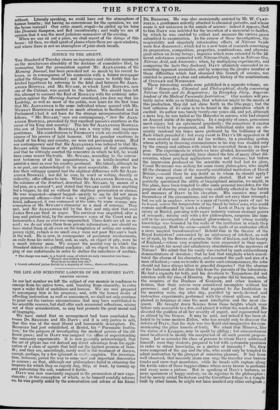VIE HAYMARKET THEATRE.
" MANCF.UVERING" OUT-DIANCEUVERED.
CANNING and some friends, in a discussion of the pleasures of theit Eton days, agreed that there was no joy equal to that of eating certain three-cornered cakes continent of jam, we believe learnedly called cocked-hats. Fired with the remembrance, the party resolved to spend a day at Eton, for the purpose of enjoying once more this treat. They did so, and applied themselves zealously to the cakes ; but they lacked the old relish. The pastry-cook was examined ; degeneracy was alleged; she denied the charge, protested the mode of manufacture was the same, and the popularity with the school as great as ever. At last Mr. R. Siurrn resolved the problem, by reminding CANNING that they had always eaten the cakes intrenched in a Latin Grammar, and that the accompaniment of the accidence was doubtless essential to their enjoyment. It must be observed that the cakes presented two unguarded angles, of which advantage might be taken by liquorish and longing schoolfellows: they were therefore partly enclosed in the Grammar for protection, mid nibbled off by degrees,—a mode securing the possession of the tart, and the peace of mind of the eater. The inconvenience was, however, as shown by Mr. R. SMITH, an ingredient in the enjoyment. But the rule is not universal, as we often find to our pain.
The Haymarket was the most popular theatre in London, when it was a nasty close hole, of no pretension and much mirth. We go there now, and we find all the inconveniences preserved with the most scrupulous exactness, but, alas ! the pleasure which once accompanied them has fled. We have not the cocked-hat cake without the grammar, but the grammar without the cake.
It is a peculiarity of rude minds to be unable to distinguish between the material and the immaterial. A savage sees an operation performed, and in repeating it he imitates every gesture and action, and ventures to reject no one circumstance he has observed in it. Worse than this is the practice of some folks in attempting to perpetuate success. They adhere to the indifferent, or detrimental, and neglect the main ingredient. The old and popular Haymarket was a square, ugly house. The present theatre is as square and ugly as imitator could wish. The seats were uncomfortable : the present seats are miracles of inconvenience. The house was of suffocating closeness : and it is as hot and void of ventilation as any lover of things as they were could desire. In a word, nothing is changed but the humour of the •stage. We hold on by our seats like a landsman on board ship in a gale of wind: We puff and we blow, and perspire as formerly ; but the laughing is discontinued. The style of the place is altered—pretension has undone it. They have played Tragedy, and Mirth has bundled up his fat sides and fled for ever. Where is Mr. Wiggins ? the visitor asks, and Echo answers where .P—Mr. Inrwins, the original genius of the Haymarket, took flight when I la»Tlet entered the
house.
We set out with the design of seeing anew piec• Manceuvering
on Wednesday night. The evening was suiteil ' :air desperate pur
pose : the rain was pouring in torrents, and seer a if it would wash down any farce—it looked winter in short, and e .1' and theatricals are true concords. But when we entered the hu : • , we were feelingly reminded of the month, for it seemed as if sunmea had shut itself up in this salamander fastness to defy the storm invading its provinces without. Literally speaking, we could have cut the atmosphere of human breaths; but having no convenience for the operation, we cut the house instead ! Our critic evasit, erupit—he girded up his loins like Dominie Sampson, and fled incontinently; and really we are of opinion that it was the most judicious manceuvre of the evening. When we can sit out a piece, we shall report of the doings of this house : till then, we shall speak of places where there are open windows, and where there is not an atmosphere of joint-stock breath.



















 Previous page
Previous page